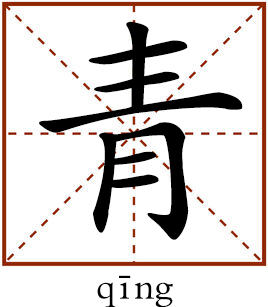Blue/Green

This character usually refers to blue or green. In ancient China, it also referred to black. The term dan qing is a poetic expression of traditional Chinese painting, because dan and qing symbolize two different minerals which are used to produce red and blue pigments.
碧海青天夜夜心
bì hǎi qīng tiān yè yè xīn
Bi and qing refers to green and blue respectively. Hai is the sea and tian is the sky. Ye ye means every night. Xin is generally known as heart or mood.
This is a line of the poem, “Chang-e, the Lady in the Moon” by Li Shangyin (1037–1101) a typical Late Tang poet who was much admired for the elegance and obscurity of his poems. “Candlelight casts shadows on the mica-slate screen;/ the milky way is dim with morning stars unseen,/ O Lady, since you have stolen the elixir,/ you must feel regret each night in the vast blue sphere” (trans. Zeng Bingheng). This poem is an imagination of the life of Chang-e. As one of China’s most well-known legendary goddesses, Chang-e drinks her husband’s elixir of immortality. She ascends to heaven and finally chooses the moon as her residence. Since then, she has lived on the moon with only a rabbit for company.
The first half of the poem is a depiction of Chang-e’s everyday life—she sits in front of a candle for a whole night, sleeplessly, watching the shadow of the candle flickering on the mica-slate screen until morning stars fade away, which indicates the early dawn. The last half of the poem expresses Chang-e’s mood—she deeply regrets leaving her lover for immortality, because this decision makes her live a life of endless loneliness.
To Chinese critics Li has been one of the most controversial, difficult, and complex of poets because of his use of exotic imagery, abstruse allusions, political allegory and personal satire involving both historical and contemporary events and figures. The political, biographical or philosophical implications contained in this poem have been a subject of debate in China. A general guess is that Li expresses his loneliness in this poem because he had pursued a generally unsuccessful career as a government official and few of his contemporaries recognized his genius, though he greatly influenced early Song Dynasty poets.
edited by REN GUANHONG
